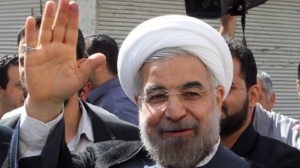 Can Iran strike a deal with the west that finally allays the worldís fears that Tehran seeks to build a nuclear bomb? As Iran prepares for the inauguration of Hassan Rohani as president this week, the question returns to the forefront of the international security agenda.
Can Iran strike a deal with the west that finally allays the worldís fears that Tehran seeks to build a nuclear bomb? As Iran prepares for the inauguration of Hassan Rohani as president this week, the question returns to the forefront of the international security agenda.Throughout the year, the primary concern of the US and its allies in the Middle East has centred on events in Syria and Egypt. But western concerns about Iranís ambitions have never abated. Tehran continues to develop its nuclear programme. It may be in a position within one or two years to make the final race for a bomb without being stopped by the US and Israel. The Iranian nuclear threat still provides the one real risk that the US will undertake a military intervention in the Middle East.
After years of stalemate, Mr Rohaniís election provides grounds for optimism. Final decisions on the nuclear file remain with Ali Khamenei, the hardline supreme leader. And descriptions of Mr Rohani as a ďmoderateĒ are sometimes misjudged. He is a regime insider. But Mr Rohani was elected with a mandate to promote centrist policies. He knows it is essential for Iran to be rid of economic sanctions. Imposed on the country because of its nuclear ambitions, the sanctions have hobbled its economic performance and caused widespread unemployment.
The goal of western policy over the next few months must be to avoid pushing Mr Rohani into a corner. The west must avoid giving ammunition to the many Iranian hardliners and apparatchiks who seek to undermine the new president to keep the country on a resolutely anti-western, nuclear path. This is the time for the US to engage in creative diplomacy with Iran, diplomacy which has three key elements.
First, the US must resist adding more economic sanctions to those in existence. The current sanctions regime is effective enough to be forcing a serious policy rethink in Iran. Legislation currently before Congress would go even further, however, and impose a blanket oil embargo at the start of next year. This must be averted.
Second, the US and its allies should reconsider their current offer to Iran. In the past 12 months, the US has tried to get Tehran to sign up to an early confidence-building deal. This would see Iran shut down its second enrichment site at Fordow; stop production of highly enriched uranium; and ship existing stockpiles of highly enriched uranium out of the country. In return, the US and its allies are offering Iran a modest peeling back of existing sanctions.
The west should revise its approach and ask ďmore for moreĒ. It should extend its demands to require that Iran freeze its centrifuge installation and allow intrusive inspections of its nuclear programme. In return, it should offer a much more substantial reversal of the banking and energy sanctions in place. It should also nod to the idea that Iran will end this entire negotiation with some limited right to enrich uranium.
Third, it is time for the US and Iran to forge a direct bilateral relationship. Thus far Iran has been negotiating with a forum of six world powers including China and Russia. The time is ripe for direct diplomatic contact between Washington and Tehran. The US should use such an opportunity to sound out Iran on regional security Ė notably in relation to Syria. But a deal on the nuclear file should not be dependent on progress here.
Mr Rohaniís inauguration opens a period of intense diplomacy over the next 12 months in which a nuclear deal should be pursued. His appointment signals that the Iranian people want the country to go in a new direction. The US and the five other world powers should stay united and tough in their demands. But they must not squander the opportunity that Mr Rohaniís election now provides.
By Financial Times
The Iran Project is not responsible for the content of quoted articles.†










